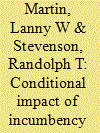| Srl | Item |
| 1 |
ID:
100768


|
|
|
|
|
| Publication |
2010.
|
| Summary/Abstract |
Previous research on coalition politics has found an "incumbency advantage" in government formation, but it has provided no clear explanation as to why this advantage exists. We classify existing theories as either preference-based or institutions-based explanations for why incumbent coalitions might be likely to form again, and we integrate these explanations into a coherent theoretical argument. We also claim that it is possible, to some extent, to distinguish these explanations empirically by taking into account the "historical context" of coalition bargaining. Using a comprehensive new data set on coalition bargaining in Europe, we show that coalitions, in general, are more likely to form if the parties comprising them have worked together in the recent past, and that incumbent coalitions are more likely to re-form if partners have not experienced a severe public conflict while in office together or suffered a recent setback at the polls. The incumbency advantage disappears completely if partners have become mired in conflict or have lost legislative seats (even after accounting for the impact of seat share on coalition size). Moreover, in certain circumstances, institutional rules that grant incumbents an advantage in coalition bargaining greatly enhance their ability to remain in office.
|
|
|
|
|
|
|
|
|
|
|
|
|
|
|
|
| 2 |
ID:
175283


|
|
|
|
|
| Summary/Abstract |
Party elites in coalition governments are acutely aware that the deals they strike will be critically evaluated by their supporters, and that they risk losing support if they are perceived as ineffective negotiators. This has a powerful influence on the bargains parties strike. Because most supporters are unaware of the complex aspects of bargains and instead rely on simple heuristics to evaluate their most visible features, parties have incentives to meet supporter expectations primarily on easily observable outcomes. To do so, they make trade-offs on less observable outcomes. This implies that the more visible features of a bargain typically do not accurately reflect the relative success of parties in coalition negotiations. We evaluate our argument using original data on the office rewards and policy risks of portfolio allocation in 16 parliamentary democracies. Our findings support our argument, and they have important implications for the nature of representation under multiparty government.
|
|
|
|
|
|
|
|
|
|
|
|
|
|
|
|